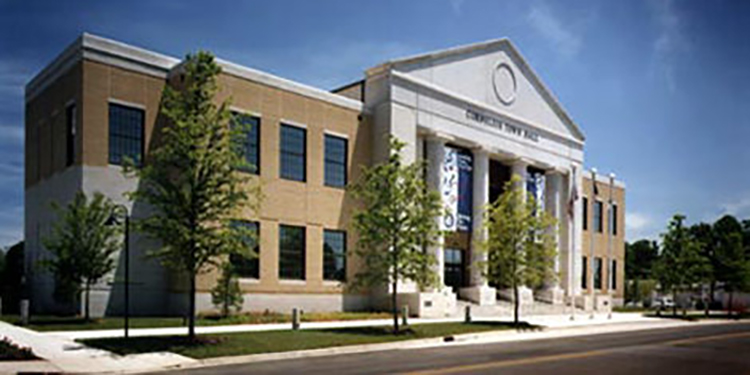
By Dave Yochum. Town Manager Andrew Grant has proposed a $24.315 million budget for FY2019-2020, a 2 cent increase above revenue neutral, or 20.2 cents. The proposed rate will be 22.2 cents per $100 of assessed valuation.

GRANT
It means the owner of a $350,000 house, about the median price home in Cornelius, would pay $770 in strictly local taxes during the next fiscal year.
The county manager has proposed a tax rate of 61.69 cents per $100 of assessed value., accounting for about three-quarters of total property taxes in Cornelius.
Total annual taxes on a house valued at $350,000, would be $2,929 as per the proposed budgets.
“This is a budget that funds the critical road projects so badly needed and allows the town to operate efficiently to meet citizens’s expectations,” Mayor Woody Washam said.
The new budget also helps fund more competitive salary ranges for police and town staff.
Despite an increase in the budget, Cornelius “will continue to maintain the lowest tax rate in the region and beyond,” Washam said.

WASHAM
The tax rate during the current fiscal year, which ends June 30, is $0.255.
Property owners’ overall tax bill depends on their valuation. The 2019 county-wide revaluation saw some property values soar while others were flat and some even declined. The total value of property in Cornelius is $7.15 billion.
Town staff salaries have been an issue, with other towns raiding local talent. A new Human Resources Director will add $53,000 to the budget, representing half a year’s budget cost. Total merit raise pool is 3.25 percent or $259,000.
The most significant proposed increase is due to debt service—a result of the massive $120 million NCDOT “bonus allocation” that pays for roundabouts and road widening all around Cornelius. To gain the NCDOT landfall, the Town of Cornelius must contribute $24 million.
“If there is a theme for the FY 2020 budget, its roads, roads, roads,” Manager Grant said.

GILROY
Debt service climbs 13 percent from $2.82 million in the current budget to $3.197 million in Grant’s proposed budget.
The new debt is on the order of $24 million, roughly double already issued debt levels.
The proposed budget calls for a healthy increase in Police spending, which rises 7.77 percent from $6.69 million during the current fiscal year, to $7.21 million in the year beginning July 1.
Fire expenses stay relatively flat, in light of the larger increase this past year: from $1.74 million to $1.76 million proposed for the new year.
Park Arts Recreation & Culture (PARC) actually drops 20.4 percent, from $3.86 million during the current fiscal year, to $3.07 million in the upcoming year. The decrease reflects fewer capital projects.
The town board must approve the new budget in June. Staff and commissioners are expected to fine-tune a spending plan that provides essential town services as well as invests in infrastructure needs like roads and sidewalks and costly equipment including a fireboat that needs repair.

BILODEAU
Only one resident spoke up about the proposed budget.
“We can’t afford to not raise taxes, especially for competitive salaries for our staff,” said resident Janet Spain.
Ominously, Grant said the current budget trajectory is “non-sustainable.” He explained there will need to be a future decision on the “tax rate or a future significant reduction in costs.”
Commissioner Dave Gilroy, a frequent budget critic, said there is not a need for a tax increase of this magnitude. He said the narrative about non-competitive salaries was incorrect.
Public comments will continue June 3. The budget could be voted on as early as then, or two weeks later on June 17.

NISWONGER
They must live with the budget until July 1, 2020.
Commissioner Denis Bilodeau commended Grant and Finance Director Julie Niswonger for their work on a complex budget with multiple competing agendas.
“They have worked hard to propose a budget sensitive to the impact of the revaluation while addressing the unprecedented increase in our debt obligations,” he said.





